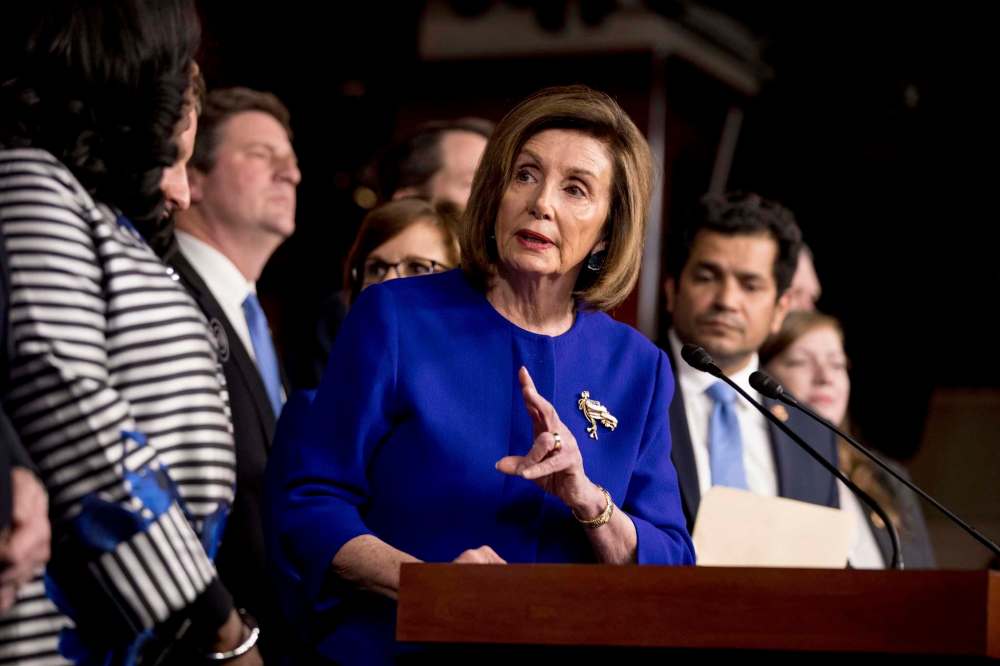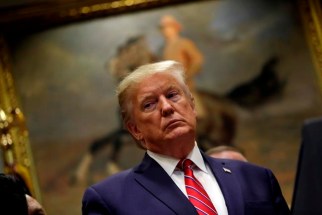Trump impeachment articles pared down
Read this article for free:
or
Already have an account? Log in here »
To continue reading, please subscribe:
Monthly Digital Subscription
$1 per week for 24 weeks*
- Enjoy unlimited reading on winnipegfreepress.com
- Read the E-Edition, our digital replica newspaper
- Access News Break, our award-winning app
- Play interactive puzzles
*Billed as $4 plus GST every four weeks. Offer only available to new and qualified returning subscribers. Cancel any time.
Read unlimited articles for free today:
or
Already have an account? Log in here »
Hey there, time traveller!
This article was published 11/12/2019 (1910 days ago), so information in it may no longer be current.
Brevity, the rather popular playwright Shakespeare once mused, is the soul of wit.
As events unfold in the republic across our southern border, it has become apparent that brevity is also the engine of impeachment.
Democrats in the House of Representatives this week formally called for the removal of Donald J. Trump from the office of the U.S. presidency, laying out in a succinct nine-page document the articles of impeachment on grounds he committed high crimes and misdemeanours in the form of abuse of power and obstruction of Congress.
Much speculation and debate preceded the issuing of the impeachment articles, over the number of articles that would be advanced and the scope of the crimes and misdemeanours Mr. Trump would be accused of committing.

In the end, rather than setting in motion a far-reaching impeachment trial seeking to encompass the myriad misdeeds the Democrats believe — with considerable evidentiary backing — Mr. Trump has perpetrated during his 3½ years in office, the decision was taken to limit the articles to the aforementioned two charges, which focus only on the president’s alleged effort to influence the upcoming 2020 U.S. election.
The document asserts that the president “used the powers of the Presidency in a manner that compromised the national security of the United States and undermined the integrity of the United States democratic process… (and) thus ignored and injured the interests of the Nation.”
The specifics of the charges relate to the now-infamous demands from the White House that Ukraine’s new president announce a corruption-related investigation of Mr. Trump’s political rival, Democrat Joe Biden, in exchange for the release of congressionally approved military aid and the promise of a coveted White House meeting with Mr. Trump, and the subsequent White House instruction that members of the Trump administration and various federal officials should defy subpoenas to testify or provide documents demanded by House committee investigations.
In preparing the impeachment articles, House Democrats opted not to pursue a third charge, obstruction of justice, a criminal offence that would necessarily have expanded the impeachment effort to include the president’s attempts to disrupt the investigation by special counsel Robert Mueller of Russian interference in the 2016 election that elevated Mr. Trump to the presidency.
In publicly releasing the articles on Tuesday, House Speaker Nancy Pelosi said, “A president who declares himself above accountability, above the American people and above Congress’s power of impeachment, which is meant to protect against threats to our democratic institutions, is a president who sees himself as above the law. We must be clear — no one, not even the president, is above the law.”
“A president who declares himself above accountability, above the American people and above Congress’s power of impeachment, which is meant to protect against threats to our democratic institutions, is a president who sees himself as above the law. We must be clear– no one, not even the president, is above the law.” – House Speaker Nancy Pelosi
In limiting the scope of the impeachment articles, Ms. Pelosi and other party leaders clearly hope to make it easier for congressional Democrats seeking re-election in conservative-leaning constituencies to support a focused and comprehensible process. In all likelihood, the full House of Representatives — with Democrats in the majority — will vote before Christmas to impeach Mr. Trump.
The new year, of course, will bring a new debate, a new setting and a decidedly different balance of power, as an impeachment trial in the Republican-dominated Senate will almost certainly acquit the president and bring this latest chapter of Trump vs. America to a close.
Like the House proceedings that led to the issuing of articles of impeachment, it will be an ugly, divisive, partisan exercise. And regardless of how it reaches its inevitable conclusion, neither side is likely to emerge citing another of Mr. Shakespeare’s oft-referenced sentiments: All’s well that ends well.










